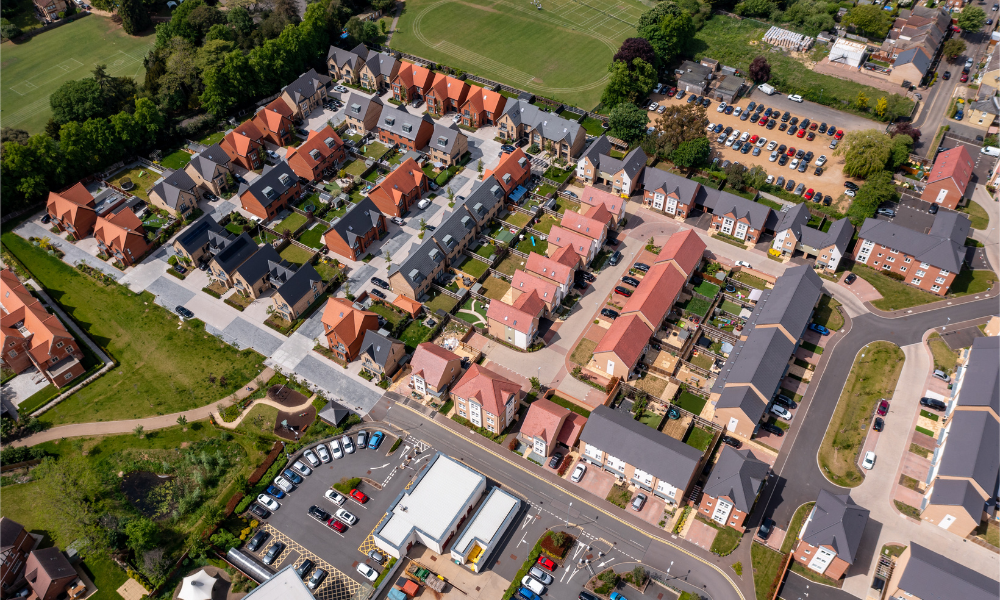"The housing market continues to adjust to the tighter lending climate"

The UK housing market continues the trend of being generally downbeat, but there are several indicators demonstrating a more stable picture emerging through the course of 2023, the Royal Institution of Chartered Surveyors (RICS) believes.
RICS’ Residential Market Survey for February 2023 has shown that new buyer enquiries rebounded to a net balance of -29%, improving from -45% in January. RICS noted that while this metric is still signalling a decline in demand – the 10th consecutive negative monthly reading for new buyer enquiries, it is also the least negative result since July last year.
The new sales indicator was also less negative in February, improving from a net balance of -36% to -26%. However, the average time taken to complete sales continues to rise and is now approaching 19 weeks.
In its latest Residential Market Survey, RICS also found that in the mainstream market, which covers prices up to £500,000, around 60% of respondents suggested that prices were being agreed at below the asking price. For properties priced between £500,000 and £1 million, the proportion jumped to just over 70%.
“The housing market continues to adjust to the tighter lending climate, with stretched mortgage affordability still weighing heavily on activity,” Tarrant Parsons, senior economist at the Royal Institution of Chartered Surveyors, commented. “Given the ongoing weakness in demand, house prices remain on a downward trajectory, and are expected to see further falls through the first half of the year at least.
“Going forward, near-term expectations suggest market activity will remain generally subdued over the coming months, although the latest survey feedback shows tentative signs that the ongoing decline in buyer enquiries is now moderating.”
Jeremy Leaf, north London estate agent and a former RICS residential chairman, said the latest figures confirm that the housing market continued to slow and became more price-sensitive in February but showed few signs of a correction.
“Worries about the cost-of-living and availability of mortgages mean homes are taking longer to sell and keeping prices in check,” Leaf stated. “However, recent falls in lending rates, inflation, and increasing property choice is contributing to a readjustment in the previously severe imbalance between supply and demand which we expect to continue into the spring.”
Sam Rees, RICS’ senior public affairs officer, added that they were emphasising ahead of the spring budget the critical role housing has to the UK economy, and the need to boost supply through new builds and commercial property conversions where appropriate, while conforming to the strictest standards.
“RICS supports efforts to improve the energy efficiency of homes and the continuation of the government’s Energy Price Guarantee,” Rees stated. “Further fiscal intervention for consumers and businesses is required to scale up the retrofitting of UK homes, and we welcome initiatives such as ECO+ that go some way in delivering such needs.”
RICS survey also looks at the current state of the lettings market
In the UK lettings market, a net balance of +32% reported a continuing increase in tenant demand, while landlord instructions continue to decline, although at a lesser pace than in the recent months at -13%.
Given the supply-demand imbalance, the rent expectations reading remains at a relatively high level of +45%.
“Supply is slowly improving partly in response to last year’s sharply rising rents, but is still not sufficient to meet demand, particularly for one- and two-bedroom flats,” Leaf commented. “On the other hand, we’ve also seen concerns about the cost-of-living keeping a lid on spiralling rents.
“Tenants may be increasingly feeling the pinch, but many landlords believe they have no option but to increase rents to meet higher mortgage repayments and/or building costs in particular.”
Rees, meanwhile, stressed that with rising rents and diminishing housing stock in the private rental sector, the government must do more to support landlords who are leaving the market due to increasing cost and regulation challenges.
“Landlords continue to raise concerns with RICS on the lack of clarity and financial support from government to meet expensive energy efficiency improvement targets which is further pressuring landlords into exiting the sector,” he said.
“RICS would also encourage the government to restore the Local Housing Allowance to the 30th percentile to support those private renters who are struggling with rising rents.”
Want to be regularly updated with mortgage news and features? Get exclusive interviews, breaking news, and industry events in your inbox – subscribe to our FREE daily newsletter.



